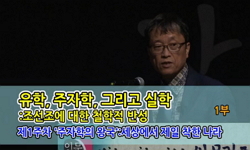심이 리이냐 아니면 기이냐 하는 문제는 주자학과 양명학이 나뉘는 중요한 표지중 하나다. 주자학에서는 성즉리와 심여리일(心與理一: 심이 리와 하나가 된다)은 주장하지만 심즉리는 긍정...
http://chineseinput.net/에서 pinyin(병음)방식으로 중국어를 변환할 수 있습니다.
변환된 중국어를 복사하여 사용하시면 됩니다.
- 中文 을 입력하시려면 zhongwen을 입력하시고 space를누르시면됩니다.
- 北京 을 입력하시려면 beijing을 입력하시고 space를 누르시면 됩니다.

心是理,还是气? - 以心说论辩为主 - = A Study of the propositions of ‘The Heart is Reason’ and ‘The Heart is Vital Force’
한글로보기https://www.riss.kr/link?id=A109523533
-
저자
선병삼 (숭실대학교)
- 발행기관
- 학술지명
- 권호사항
-
발행연도
2024
-
작성언어
Chinese
-
주제어
【Keywords】the mind-heart is principle ; the nature is principle ; Yi Hangro ; Yi Jinshang ; Jeon Woo ; 【주제분류】한국철학 ; 주자학 ; 양명학【주 제 어】성즉리 ; 심즉리 ; 이항로 ; 이진상 ; 전우
-
등재정보
KCI등재
-
자료형태
학술저널
- 발행기관 URL
-
수록면
417-439(23쪽)
- DOI식별코드
- 제공처
-
0
상세조회 -
0
다운로드
부가정보
국문 초록 (Abstract)
就“心是理”或者“心是气”而言,这个问题是朱子学与阳明学的分界点。依朱子学的公理,性即理,心与理一,而不是心即理。相反,王阳明肯定性即理,反而特别主张心即理。在朝鲜最后之性理学大论争的心说论辩中,出现一个特色,就是朝鲜性理学者主张“心即理(心主理)”。衆所周知,朝鲜王朝(1392-1910)的统治理念是儒学,特别是性理学(朱子学),故排斥老佛,同时贬斥陆王的心学,将心即理说为异端邪说。因此在心说论争当中性理学者却提倡心即理、心主理说,这确实难以理解的。田愚基于“性即理”和“心是气”的立场,坚决反对他们的主张成为阳明学。那幺,华西李恒老(1792-1868,字:华西)、寒洲李震相(1818-1886,字:寒洲)主张张“心即理(心主理)”,而接近于阳明学呢?当然不是的,他们坚决反对阳明学。总之,李华西和李寒洲着重于理而将理为心性一致的基础,积极诠释为理有体用、理有动静、理生气,从而积极宣扬理的主宰性。
심이 리이냐 아니면 기이냐 하는 문제는 주자학과 양명학이 나뉘는 중요한 표지중 하나다. 주자학에서는 성즉리와 심여리일(心與理一: 심이 리와 하나가 된다)은 주장하지만 심즉리는 긍정하지 않는다. 반면에 왕양명은 성즉리를 긍정하면서도 특별히 심즉리를 주장한다. 그런데 조선시대 성리학3대논쟁의 대미를 장식한 심설논쟁 당시, 심즉리(심주리)를 주장하는 성리학자들이 등장한다. 잘 알려진 것처럼 조선 시대는 유학을 통치 이념으로 삼아, 특히 주자학을 정통으로 표방하면서, 노불은 물론이고 육왕심학을 이단사설로 배척했다. 이런 상황에서 심설논쟁 당시 심즉리와 심주리(心主理)를 주장하는 성리학자가 등장했다는 점은 특기할 만하다. 전우는 성즉리와 심시기에 입각하여 이들의 주장이 양명학이 된다고 철저하게 반대한다. 그렇다면 이항로와 이진상이 심즉리(심주리)를 주장한 것이 양명학으로 경도되었다는 것인가? 물론 그렇지는 않다. 그들은 양명학을 분명하게 반대하고 있다. 따라서 이들이 심성일치(心性一致)론에 기반을 두고 리의 체용과 동정, 이생기(理生氣: 리가 기를 낳는다)를 주장하는 것 등은 리의 주재성을 적극적으로 표방하는 과정이었다고 할 수 있다.
就“心是理”或者“心是气”而言,这个问题是朱子学与阳明学的分界点。依朱子学的公理,性即理,心与理一,而不是心即理。相反,王阳明肯定性即理,反而特别主张心即理。在朝鲜最后之性理学大论争的心说论辩中,出现一个特色,就是朝鲜性理学者主张“心即理(心主理)”。衆所周知,朝鲜王朝(1392-1910)的统治理念是儒学,特别是性理学(朱子学),故排斥老佛,同时贬斥陆王的心学,将心即理说为异端邪说。因此在心说论争当中性理学者却提倡心即理、心主理说,这确实难以理解的。田愚基于“性即理”和“心是气”的立场,坚决反对他们的主张成为阳明学。那幺,华西李恒老(1792-1868,字:华西)、寒洲李震相(1818-1886,字:寒洲)主张张“心即理(心主理)”,而接近于阳明学呢?当然不是的,他们坚决反对阳明学。总之,李华西和李寒洲着重于理而将理为心性一致的基础,积极诠释为理有体用、理有动静、理生气,从而积极宣扬理的主宰性。
다국어 초록 (Multilingual Abstract)
During the last great debate on the nature of principle(性理) in Joseon, a distinctive characteristic emerged: Korean Confucian scholars advocated for the idea that “the heart is principle”(心即理). It is well known that the ruling ideology of the Joseon Dynasty(1392-1910) was Confucianism, especially Zhu Xi’s philosophy (Zhuzi Xue), which rejected Daoism and denigrated Lu Wang’s heart-centered philosophy, labeling the idea that the heart is principle as an aberrant or heretical thought. Thus, the fact that Confucian scholars engaged in the debate by promoting the notion of the heart being principle(心主理) is indeed puzzling. Of course, figures like Yi Hangro(1792-1868) and YI Jinshang(1818-1886), who advocated for the concept that the heart is principle(心主理), were still firmly opposed to Yangming’s philosophy.
In summary, Yi Hangro and YI Jinshang emphasized the idea that the mind-heart is principle, interpreting it as principle having form and function, as well as motion and stillness, allowing for the idea that principle engenders vital force. This line of thought conflicts with the belief that principle dominates vital force and is devoid of action or knowledge. Ultimately, it could develop into an acknowledgment of a personal deity, suggesting a potential for transcending Zhu Xi’s philosophy.
The issue of whether “the heart is principle” or “the heart is vital force” represents a critical dividing line between Zhu Xi’s philosophy(Zhuzi Xue) and Wang Yangming’s school of thought(Yangming Xue). According to Zhu Xi’s axioms, hum...
The issue of whether “the heart is principle” or “the heart is vital force” represents a critical dividing line between Zhu Xi’s philosophy(Zhuzi Xue) and Wang Yangming’s school of thought(Yangming Xue). According to Zhu Xi’s axioms, human nature(性) is equal to principle(理), implying that the heart(心) and principle are one through cultivation, but not that the heart is equivalent to principle. In contrast, Wang Yangming asserts that human nature indeed equals principle and particularly emphasizes that the heart is principle.
During the last great debate on the nature of principle(性理) in Joseon, a distinctive characteristic emerged: Korean Confucian scholars advocated for the idea that “the heart is principle”(心即理). It is well known that the ruling ideology of the Joseon Dynasty(1392-1910) was Confucianism, especially Zhu Xi’s philosophy (Zhuzi Xue), which rejected Daoism and denigrated Lu Wang’s heart-centered philosophy, labeling the idea that the heart is principle as an aberrant or heretical thought. Thus, the fact that Confucian scholars engaged in the debate by promoting the notion of the heart being principle(心主理) is indeed puzzling. Of course, figures like Yi Hangro(1792-1868) and YI Jinshang(1818-1886), who advocated for the concept that the heart is principle(心主理), were still firmly opposed to Yangming’s philosophy.
In summary, Yi Hangro and YI Jinshang emphasized the idea that the mind-heart is principle, interpreting it as principle having form and function, as well as motion and stillness, allowing for the idea that principle engenders vital force. This line of thought conflicts with the belief that principle dominates vital force and is devoid of action or knowledge. Ultimately, it could develop into an acknowledgment of a personal deity, suggesting a potential for transcending Zhu Xi’s philosophy.
동일학술지(권/호) 다른 논문
-
왕양명 양지의 회복과 실천의 일상 적용 가능성 연구 - 조심(照心)과 망심(妄心)을 중심으로 -
- 한국양명학회
- 이태형
- 2024
- KCI등재
-
계본의 『論語私存』 연구 - 양명학적 경학의 한 예시(3) -
- 한국양명학회
- 조희정
- 2024
- KCI등재
-
- 한국양명학회
- 김지연
- 2024
- KCI등재
-
『노자 』 ‘守中’ 개념에 관한 주석사적 고찰 (3) - 唐代 주석을 중심으로 -
- 한국양명학회
- 김형석
- 2024
- KCI등재




 KCI
KCI




